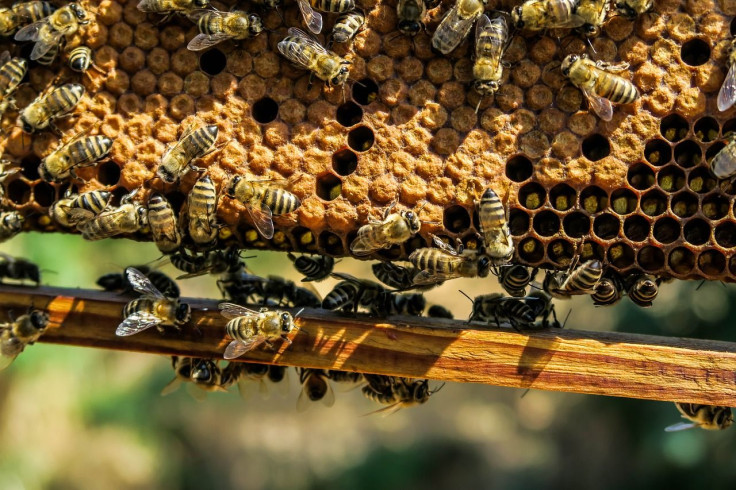Honey Bees Produce 'Harsh' Alarm Sounds When A Giant Hornet Attacks Their Hive: Study
KEY POINTS
- Honey bees have devised ways to deter giant hornet attacks
- Bees in Vietnam emit a "harsh and irregular" signal to alert others of the threat
- The signals trigger the start of the bees' defensive actions against the predators
What do honey bees do when a giant hornet attacks their hive? Researchers have documented the noisy way they alert their fellow bees of the intruder.
Giant hornets are apex predators with massive mandibles, which they use to kill their prey and decimate entire hives. In places where honey bees and these predators have lived together for quite a while, honey bees have developed their own ways of defending their hives.
For instance, Japanese honey bees have been known to swarm around an Asian Giant Hornet (Vespa mandarinia) and beat their wings furiously to essentially "cook" it to death. A previous study by a team of researchers, including Heather Mattila of Wellesley College, also found that Apis cerana honey bees in Vietnam use tools to protect themselves from another Vespa species, the Vespa soror, by lining their hives' entrances with animal dung to deter the predator.
In a new study, Mattila and her fellow researchers found how Apis cerana honey bees in Vietnam actually alert their fellow hive-mates when a Vespa soror hornet attacks. It turns out, they emit an "antipredator pipe" signal to warn the other bees of the intruder.
The researchers have been studying giant hornet and honey bee interactions in Vietnam for seven years, Wellesley College noted in a news release. They have collected video and audio clips of hornet attacks, with microphones capturing nearly 30,000 bee signals over 1,300 minutes.
In a video shared by Wellesley College, one can hear just how loud and "harsh" the signal is. Compared to the calm control colonies, the colonies being attacked were "noisy and frenetic," having noise levels that were "eight times higher" than if an attacker is not present.
The alarm did not only warn the other bees of the attacker but also increased the number of bees at the entrance of the hive and signaled the beginning of their defense, which included the previously observed "fecal spotting."
The antipredator pipe that they do when a giant hornet attacks is different from previously described sounds. Instead of the usual hisses, they are "harsh and irregular" and are quite like the shriek and screaming sounds that other animals make in response to predators, the news release noted.
"The pipes share traits in common with a lot of mammalian alarm signals, so as a mammal hearing them, there's something that is instantly recognizable as communicating danger," Mattila said in the news release. "It feels like a universal experience."
For instance, bees constantly hiss but they did it even more so when there were hornets around. Exactly why they do it, however, is still unknown.
"Hisses in other animals are often used to intimidate a predator, but that is not likely the case with bees, mostly because they hiss a lot without predators, too," Mattila said as per Ars Technica. "One idea that has been proposed (not by us) is that hissing helps to momentarily hush the colony because bees stand still for a beat after a hiss. It might help workers perceive other sounds in the nest if most bees stop moving for a second."
The researchers are planning to further investigate other behaviors they observed when they made the antipredator pipes. This includes raising the abdomen, running frantically, buzzing their wings and revealing a pheromone-producing gland. According to Wellesley College, this suggests bees use several types of communication strategies to alert their nestmates.
They are also looking at the hornet attacks from the point of view of the hornets, according to Ars Technica.

© Copyright IBTimes 2024. All rights reserved.






















